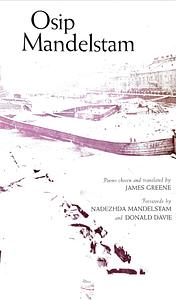Take a photo of a barcode or cover
My interest in Osip Mandelstam was initially piqued when I learned that he had a whirlwind love affair with my homegirl Marina Tsvetaeva in 1916. Brief though it was, this liaison was the inspiration for Tsvetaeva's bittersweet poem "Where does such tenderness come from?" (link), which was set to music by Dmitri Shostakovich in 1973. Funny how these short-lived sexual connections, these absent-minded stirrings of one type of brine with another, end up leaving such a huge footprint on the universe.
My copy of Mandelstam's "Selected Poems" was brought out by the same publishing house from whence issued my copy of Tsvetaeva's "Selected Poems" (i.e., Penguin Twentieth-Century Classics -- those sea-green paperbacks whose glossy covers are so pleasant to stroke with one's entire hand).
On the cover of Marina's book, there is a black-and-white photo of Marina herself, unsmiling, with thick dark eyebrows and a timeless Cleopatra-esque haircut.
On the cover of Osip's book, there is an abstract painting of a red rectangle superimposed on a background of wavy blue and gray lines.
Why such a difference?
Maybe it has something to do with the fact that Marina's poetry is largely autobiographical -- and sometimes even egoistical, in the best sense of the word:
"In a world where most people
are hunched and sweaty
I know only one person
equal to me in strength."
In contrast, Osip's poetry often seems to take a broader, more cosmopolitan, more historical perspective, and his poetic voice is sometimes self-deprecating and self-effacing:
"I have accompanied the rapture of the universe
As muted organ pipes
Accompany a woman's voice."
The texture of Marina's poetry is often harsh and jagged and wild, whereas Osip's neoclassicism-tinted poetry is almost always confined within marble columns of rhyme and meter.
Of course, this assessment of Marina's and Osip's differences is overly simplistic: it is easy to argue that these two Russian giants in fact have more similarities than differences. Like Tsvetaeva's, Mandelstam's poetry is built around an autobiographical framework (his is the archetypal tale of a poet who seals his own fate by opposing his homeland's tyrannical government). Like Tsvetaeva, Mandelstam is not deficient in self-worth and sometimes even displays a fair amount of braggadocio ("My blood is not wolf's blood/And only an equal shall kill me"). Both Tsvetaeva and Mandelstam enjoy incorporating Greek myths into their poetry: Tsvetaeva likens herself to the star-crossed Amazon queen Penthesilea, while Mandelstam compares himself and his wife Nadezhda to that most primal of mixed-race couples, Zeus and Europa.
I think I will be returning to these poems again and again.
My copy of Mandelstam's "Selected Poems" was brought out by the same publishing house from whence issued my copy of Tsvetaeva's "Selected Poems" (i.e., Penguin Twentieth-Century Classics -- those sea-green paperbacks whose glossy covers are so pleasant to stroke with one's entire hand).
On the cover of Marina's book, there is a black-and-white photo of Marina herself, unsmiling, with thick dark eyebrows and a timeless Cleopatra-esque haircut.
On the cover of Osip's book, there is an abstract painting of a red rectangle superimposed on a background of wavy blue and gray lines.
Why such a difference?
Maybe it has something to do with the fact that Marina's poetry is largely autobiographical -- and sometimes even egoistical, in the best sense of the word:
"In a world where most people
are hunched and sweaty
I know only one person
equal to me in strength."
In contrast, Osip's poetry often seems to take a broader, more cosmopolitan, more historical perspective, and his poetic voice is sometimes self-deprecating and self-effacing:
"I have accompanied the rapture of the universe
As muted organ pipes
Accompany a woman's voice."
The texture of Marina's poetry is often harsh and jagged and wild, whereas Osip's neoclassicism-tinted poetry is almost always confined within marble columns of rhyme and meter.
Of course, this assessment of Marina's and Osip's differences is overly simplistic: it is easy to argue that these two Russian giants in fact have more similarities than differences. Like Tsvetaeva's, Mandelstam's poetry is built around an autobiographical framework (his is the archetypal tale of a poet who seals his own fate by opposing his homeland's tyrannical government). Like Tsvetaeva, Mandelstam is not deficient in self-worth and sometimes even displays a fair amount of braggadocio ("My blood is not wolf's blood/And only an equal shall kill me"). Both Tsvetaeva and Mandelstam enjoy incorporating Greek myths into their poetry: Tsvetaeva likens herself to the star-crossed Amazon queen Penthesilea, while Mandelstam compares himself and his wife Nadezhda to that most primal of mixed-race couples, Zeus and Europa.
I think I will be returning to these poems again and again.
Thought I'd run through these today what a curious man I should get my hands on a Russian selected at some point. Would be worthwhile tracing the development of OM in relation to Ezra Pound for reasons that become clear.
These are deft and piercing even in translation. There's a consciousness of this. His Grecian slant in the earlier collections - I'll cautiously call it an address to the Sapphic poets of antiquity as I do think I noticed a sly reference to Anyte of Tegea as well as Sappho - does of course make one think of Pound's Lustra . Perhaps perhaps
These are deft and piercing even in translation. There's a consciousness of this. His Grecian slant in the earlier collections - I'll cautiously call it an address to the Sapphic poets of antiquity as I do think I noticed a sly reference to Anyte of Tegea as well as Sappho - does of course make one think of Pound's Lustra . Perhaps perhaps
challenging
dark
emotional
reflective
slow-paced


